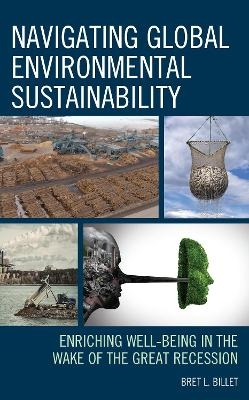
Navigating Global Environmental Sustainability
Enriching Well-Being in the Wake of the Great-Recession
Seiten
2023
Lexington Books (Verlag)
978-1-4985-7957-5 (ISBN)
Lexington Books (Verlag)
978-1-4985-7957-5 (ISBN)
The Great Recession provided an opportunity to reconsider how to simultaneously enhance the well-being of individuals, corporations, countries, and the global environment. A half-century of vital environmental data demands examining several questions pertaining to the impact of a recession on sustainable environmental consumption. Does a recession provide an occasion for productive dialogue that might reconcile the ostensible incompatibility of economic and ecological rationales? Does it constitute an artificial “turning point” whereby appropriate incentives may induce productive change? Are post-recession environmental consumption patterns indicative of government encouragement, and corporate willingness, to pursue transformative environmental technologies? Alternatively, are the patterns illustrative of countries transferring their environmental consumption to other countries via international trade?
Bret L. Billet argues that the simultaneous investigation of both the Ecological Modernization theory and the Ecological Unequal Exchange theory strengthens the present quantitative analysis, enhancing understanding of the recession, well-being, sustainable environment nexus. Each ecological theory is rooted in the politicized evolution of traditional theories of economic development. The introduction of an Aristotelean conception of development as well-being, an exceptionally large number of cases, and the analysis of multiple country subsets, results in a more robust inquiry as to the impact of the Great Recession on the global sustainable environment.
Bret L. Billet argues that the simultaneous investigation of both the Ecological Modernization theory and the Ecological Unequal Exchange theory strengthens the present quantitative analysis, enhancing understanding of the recession, well-being, sustainable environment nexus. Each ecological theory is rooted in the politicized evolution of traditional theories of economic development. The introduction of an Aristotelean conception of development as well-being, an exceptionally large number of cases, and the analysis of multiple country subsets, results in a more robust inquiry as to the impact of the Great Recession on the global sustainable environment.
Bret L. Billet is Professor of Political Science and Co-coordinator of the International Relations and Environmental Science and Studies Programs at Wartburg College in Waverly, Iowa.
Chapter 1: The Historical Emergence of the Global Sustainable Environment
Part I: The Global Sustainable Environment
Chapter 2: Subjective Perceptions
Chapter 3: The Objective Condition
Part II: Sustainability, Development, and Theory
Chapter 4: On Development, Eudaimonia, and Sustainable Well-Being
Chapter 5: The Intellectual Roots of Ecological Modernization and Ecological Uneven Exchange
Part III: A Test of Two Theories in the Post-Great Recession Era
Chapter 6: Essential Issues in the Study of EM and EUE
Chapter 7: An Examination and Evaluation of EM and EUE
| Erscheinungsdatum | 22.08.2023 |
|---|---|
| Verlagsort | Lanham, MD |
| Sprache | englisch |
| Maße | 159 x 236 mm |
| Gewicht | 603 g |
| Themenwelt | Sozialwissenschaften ► Politik / Verwaltung ► Politische Theorie |
| Sozialwissenschaften ► Politik / Verwaltung ► Staat / Verwaltung | |
| Wirtschaft ► Volkswirtschaftslehre ► Finanzwissenschaft | |
| ISBN-10 | 1-4985-7957-4 / 1498579574 |
| ISBN-13 | 978-1-4985-7957-5 / 9781498579575 |
| Zustand | Neuware |
| Informationen gemäß Produktsicherheitsverordnung (GPSR) | |
| Haben Sie eine Frage zum Produkt? |
Mehr entdecken
aus dem Bereich
aus dem Bereich
Der »progressive« Angriff auf Israel, Judentum und …
Buch | Softcover (2024)
edition TIAMAT (Verlag)
CHF 39,20
ein Vortrag
Buch | Softcover (2024)
Suhrkamp (Verlag)
CHF 13,95
Geschichte, Vordenker, Organisationen
Buch | Softcover (2023)
C.H.Beck (Verlag)
CHF 18,90


